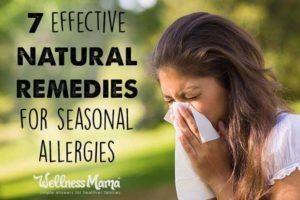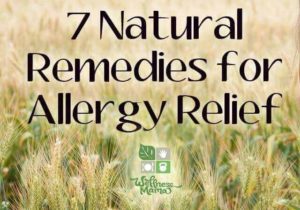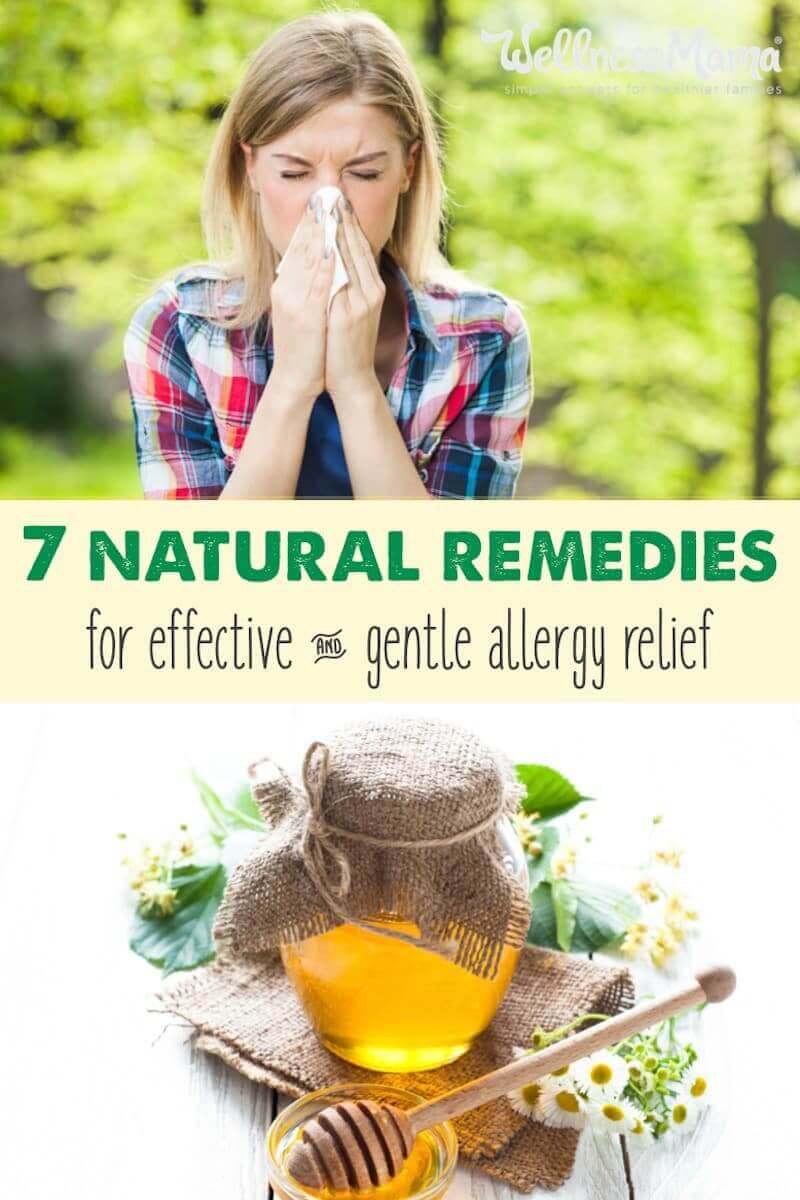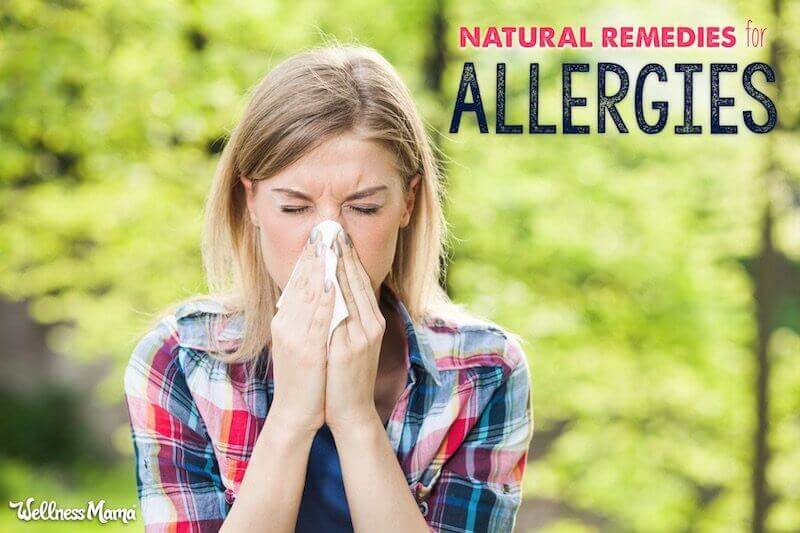Oh, seasonal allergies. They truly can make life miserable. The good news is, there are things we can do! Many people unnecessarily suffer from seasonal allergies when a few simple natural remedies can offer a lot of allergy relief.
Studies estimate that over 25% of the population suffers from allergic disorders and climate change theories suggest the problem is growing. Common allergen triggers include pollen from grass and trees, the fecal particles of dust mites, animal dander, certain foods, air pollution, beauty product ingredients, or even insect bites.
As prime allergy season approaches (at least in our area) I’m sharing the natural remedies that I use and work for us when needed. These won’t be as immediately effective as a medication, but over the long-term these methods have lessened my seasonal allergies greatly.
What Causes Seasonal Allergies?
Here’s the deal:
Diet, strong gut health, and health overall can make a big difference when it comes to seasonal allergies because allergic response has everything to do with the immune system.
I like to describe the body as a bathtub. Every time anything enters our bodies — be it from our food, water, air, etc. — our body reacts. This is good and nature’s way of keeping the body in a state of balance (homeostasis).
At a certain point if too much goes into the bathtub, it’s going to overflow. Overloaded and overstimulated, the immune system responds to normally harmless substances as if against a harmful foreign invader.
How Allergy Symptoms Start
The conception that antibodies, which should protect against disease, are also responsible for disease, sounds at first absurd.
Clemens von Pirquet (1906)
Scientists have learned a lot about allergies since Clemens von Pirquet first coined the term.
Defined as “an abnormal adaptive immune response,” allergic disorders occur when the body responds to a usually harmless substance with an increase in IgE attached to mast cells in the body and Type 1 T helper cells (Th1). Reactions such as constriction of the bronchial tubes, mucus secretion, and increased vascular permeability may occur within minutes.
If the exposure exceeds the body’s first immune response, this reaction begins to trigger further activation of leukocytes and Type 2 T helper cells (Th2). This is a stronger immune response the body mounts to things like parasites and physical invaders. This manifests in different ways depending on the person’s genetics and where the body perceives the invasion. Symptoms may include:
- fatigue (sometimes extreme)
- hay fever (runny nose, itchy eyes, congestion)
- nasal drip
- digestive upset and nausea
- eczema
- asthma
- even anaphylaxis
When Allergies Become Chronic
With repeated exposure the inflammatory response becomes chronic. A 2008 journal article on the development of allergic inflammation explains this systemic allergic response as:
Persistent inflammation induced by prolonged or repetitive exposure to specific allergens, typically characterized not only by the presence of large numbers of innate and adaptive immune cells (in the form of leukocytes) at the affected site but also by substantial changes in the extracellular matrix and alterations in the number, phenotype and function of structural cells in the affected tissues.
In other words, the misery allergy sufferers feel is very real and more than a case of the sniffles!
Allergy testing may be helpful to determine triggers but typical treatment usually involves routinely taking an antihistimine or corticosteriod which can have undesirable side effects. There are two main ways to help stop allergies naturally:
- Limit exposure to possible allergens (like putting less in the bathtub)
- Support a strong healthy immune system (like increasing the size of our bathtub)
How to Treat Seasonal Allergies and Get Relief Naturally
We don’t suffer from many allergies anymore after our time on the GAPS diet, but I still occasionally get hit with an allergy attack from dust after cleaning though (a reason not to clean? I think yes!).
These simple natural remedies have been very effective for allergy relief in our family. Different people seem to benefit from different remedies depending on certain genetic factors and which allergens you are reacting to, so it might be worth trying more than one of these to see which works best for you. Some of the remedies are the same as what I do for sinus infections too.
I’ll start with simple suggestions and work up to solutions for more serious allergy problems.
1. Apple Cider Vinegar
Apple cider vinegar is an age old remedy that is often recommended for a variety of health conditions. I’ve personally used it for allergy relief (and heartburn relief) with great success. The theory is that its ability to reduce mucous production and cleanse the lymphatic system makes it useful for allergies. It is also said to help digestion, weight loss, and more so it is worth a try!
What I did: When allergies hit, I mixed a teaspoon of organic, unfiltered apple cider vinegar with “The Mother” (that part is important) into a glass of water and drank this three times a day. “The Mother” is simply a colony of beneficial bacteria present in some organic and unfiltered ACV brands. Check the label, it should list if it contains it.
I use this brand but it is also quite simple to make your own. Apple cider vinegar helped me with relief of acute allergy symptoms and seemed to help avoid allergy attacks as well when I do it daily, so if you suffer from allergies at a certain time of year start well before.
2. Wash Your Nostrils
This remedy works by preventing the offending allergen (or at least as much of it) from entering your airways.
Neti Pot

It took me a while to try the Neti Pot simply because I’m a big scaredy cat about pouring things in my nose. I’m glad I took the leap though because it’s not half as bad as it sounds! (In fact, I kind of love it!). The basic theory is that you use a Neti Pot filled with a sterile saline solution to flush out the sinuses of allergens and irritations.
Surprisingly, I’ve heard this recommended by conventional and alternative doctors, and it seems that it doesn’t really have a downside. It is recommended to use previously boiled or distilled water, not water straight from the tap (because, parasites … I don’t really like to think about it!)
To use: Either use a pre-made saline rinse or make your own by dissolving 1 teaspoon of Himalayan or just plain sea salt in a quart of boiled distilled water. Cool completely. Put in the Neti Pot and pour through one nostril and let it drain out the other. Get full instructions here.
Saline Spray
An option for Neti Pot sissies like me: I like this natural saline spray with xylitol for extra help with soothing inflammation and opening airways. We use it for one of our kids with large tonsils as well to help keep post-nasal drip and sore throats away.
To use: Spray saline into nostrils a few times a week or even daily for routine maintenance (whether or not you have symptoms).
3. Quercetin
Quercetin is a natural bioflavonoid that is said to help stabilize mast cells to keep them from releasing histamine. It is also a potent antioxidant that is said to help reduce inflammation. It is best used as a long term remedy and many people start taking it about 4-6 weeks before allergy season to help prevent allergy symptoms.
As with any herb, you should check with your doctor before using, especially if you have a liver problem, are pregnant, or are on hormonal contraceptives.
To use: Though quercetin is naturally found in foods like citrus and broccoli, it is very difficult to get the amount needed to relive allergies from food alone. A supplemental dose from a quality source can be helpful for preventing allergies or helping acute symptoms. Start 4-6 weeks before allergy season for best results.
4. Nettle Leaf
Nettle leaf is another natural antihistamine that can be very effective as it naturally blocks the body’s ability to produce histamine. It grows in many places and can be made in to a tincture or tea, but for allergy relief, capsules made from dried nettle leaves are the easiest and most effective option.
Nettle leaf can also be used in combination with other herbs to make a soothing herbal tea for allergy relief. It is often mixed with peppermint leaf and sometimes red raspberry leaf to make a refreshing allergy relief tea.
What I do: I often include nettle in homemade herbal tea during allergy season (recipe at the bottom of this post) and use capsules for acute relief of allergy symptoms.
5. Probiotics
Allergies are the result of an imbalance in the immune system that causes the body to react too strongly to a stimuli. Many studies link the presence of beneficial bacteria in the gut with reduced incidence of allergies.
Evidence is even emerging that a mother’s gut bacteria during pregnancy and nursing can impact a child’s likelihood of getting allergies throughout life, as can exposure to overly sterile environments.
While we can’t do much about our mothers’ diets while they were pregnant, balancing gut bacteria now and consuming enough beneficial bacteria can have a positive effect on allergies now.
What I do: I make sure we consume a varied diet that includes plenty of fermented foods and drinks which can help boost gut bacteria. We also take a Probiotic.
6. Local Honey
There isn’t much scientific evidence to back this one, but there seems to be a lot of anecdotal evidence from people who have tried it. (Even Mark Sisson weighed in on the subject here). The theory is that consuming local honey from where you live will help your body adapt to the allergens in the environment there. This is supposed to work like a natural allergy “shot” and doesn’t seem to have a downside.
What I do: Consume a teaspoon or more of raw, unprocessed local honey from as close to where you actually live as possible. Do this one or more times a day to help relieve symptoms. It is often suggested to start this a month or so before allergy season.
7. Anti-inflammatory Foods
Foods, teas, and spices with known anti-inflammatory benefits may play a role in reducing unpleasant allergy symptoms. A 2016 study in the Journal of Nutritional Biochemistry found that ginger given orally to mice reduced sneezing and congestion as well as lowered mast cell response. Green tea shows similar effects.
What I do: Serve plenty of herbs and spices with meals, as well as green and herbal teas. Also combine three of these tips in one by making this Ginger Switchel drink.
8. Diet Changes

If all else fails, sometimes dietary changes can be the answer to allergy problems. Lots of healing bone broth and conducting an elimination diet are good places to start.
After our experience, I’d definitely encourage this as an option, especially for severe allergies or those in need of gut healing/rebalancing.
What we did: We followed the GAPS diet for several months and had success improving our seasonal allergies and even healing some rather severe food allergies in one of our children.
9. Gut Testing
If you truly suffer with allergies and suspect a comprised gut at the bottom of it, consider getting testing to get clear picture of what is going on in your gut and how to fix it.
Yes, this literally means mailing poop to a lab but I learned so much from this test and still continue to benefit from knowing specific ways to improve my individual gut. Advances in at-home testing mean you don’t need to go to a doctor or a lab.
What I use: Viome is the company I use and trust. See the results of my gut health test here.
In some cases, finding a clean, natural medication can be the last resort. I recommend Genexa for any over the counter needs.
This article was medically reviewed by Dr. Ernesto “E” Gutierrez. Dr. E is a physician by training and an educator by choice. His training background includes an MD degree and additional degrees in Age Management and Regenerative Medicine.As always, this is not personal medical advice and we recommend that you talk with your doctor.
Do you have allergies? What has helped you the most? Share below!



Leave a Reply